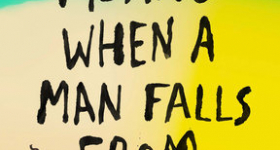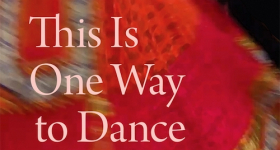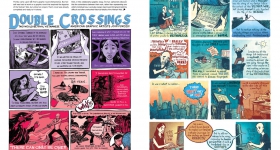Into the text we go, beginning with the death of the poetic speaker's mother. This is the beginning of the heartbreak; the speaker has come unmoored, from family, from a home base, and finds anchor instead in language. Chinese, Japanese, What Are These? is a largely multilingual text in which the poet and the poetic speaker can only truly communicate by moving in and out of English, in that space where meaning can get lost with translation.
In "Fukujoshi," we are told various cultures' terms for death during orgasm. "Fukujoshi," he tells us, means, "death atop the stomach." He believes Bruce Lee died this way. Here, Carbo gives our Asian American male icon not just sexuality, but eroticism.
Carbo writes also about his own desire quite openly. This desire is also tied to using language, where there is pleasure in meaning and sound. We see this in poems throughout this collection including "Lechuga Pechuga," "Her Ahs and Ohs," "Saussure's Remedy," and in "Rising from Your Book," which is both a litany and an abecedarian:
the silence of Telemachus' taurine thighs
the silence of November's umbra
the silence of Anne Boleyn's unhallowed head
the silence of Fermat's vinculums
the silence of wambling bees
the silence of Dali's xanthous eruptions
the silence of a persuasive yoni
the silence of feasting zyzzyva
Running throughout this entire collection is his dissatisfaction with American ineloquence, American monolingualism and monoculturalism, and American intolerance for "others." In "Dirty Knees," when the mean-spirited rhyme of the book title is directed at the speaker's preadolescent niece, her American world continues to shatter all around her. His speaker's compassionate tone and measured stanzas temper the rage. From this rage, he shifts his energy into creation myths and origin stories. This is how he restarts, imagining the world as a clean slate.
In the book's final poem, "The Bridge Above the Clouds," his ultimate act of defiance as an angry Asian American man fed up with North American racism is to leave. Armed with "a one-way / flight on Business class from MIA to BCN," Miami to Barcelona, he never looks back. Think of the 20th century's many writer and artist of color expatriates who flourished as artists elsewhere. I wonder how many of us angry Asian Americans would really do this, however fed up we are with American racism.
I think of the speaker leaving on his own terms as a kind of death amid pleasure. There's lots of death in this collection, and the speaker also morbidly imagines his own. Still, I think of this final poem -- which begins with his own elderly father's death, includes some thoughts on suicide as he drives his rented Peugeot through European winding roads to the clouds -- not as a suicide note, but as a poem of necessary endings before beginning anew.
Chinese, Japanese, What Are These?
by Nick Carbo
Pecan Grove Press, 2009
ISBN: 978-1-931247-64-1 $15









Comments